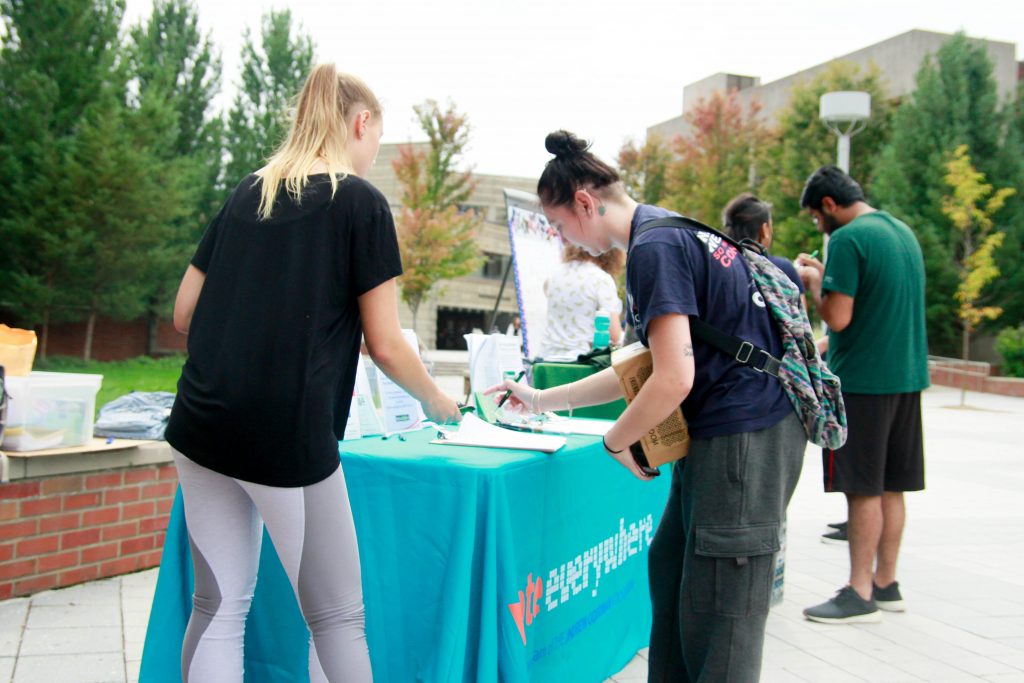
According to the 2018 Voter Engagement Survey from The Atlantic, 28 percent of young adults ages 18 to 29 said they will definitely be voting in the 2018 midterm elections, when all 435 seats in the House of Representatives and 34 of the 50 seats in the Senate will be contested. In comparison, 74 percent of adults aged 65 and over committed to turning out on Election Day.
The statistics are indicative of low mobilization among young voters. The lack of enthusiasm for elections extends to Binghamton University’s campus, where 350 students voted in the 2014 midterm election, and only 167 voted last year, despite BU offering on-campus voting.
In an effort to boost those numbers on Nov. 6, the Center for Civic Engagement (CCE), off-campus organizations and student groups are encouraging students to exercise their right to vote. The groups also aim to educate students on their voting rights and options, including their ability to register to vote in Broome County or in their hometowns.
Ben DeAngelis, political engagement coordinator at the CCE, wrote in an email that overall student mobilization is on the rise for 2018. Between 2012 and 2016, both presidential elections, BU’s student voting rate increased by 10 percentage points, widely surpassing the 3 percent average increase at colleges and universities across the country. Thus far, the CCE has registered over 1,000 students to vote in this academic year and has assisted roughly 325 with absentee ballots. Registration remains open until Oct. 12, and the CCE plans to ramp up registration and mobilization efforts leading up to the deadline.
But another part of increasing young voter turnout lies in the ability to actually draw students out on Election Day. Leading up to midterms, the CCE is hoping to attract students to the polls by giving them the resources to cast an informed vote. Their efforts include publishing candidate responses to student-centered questionnaires and sharing other nonpartisan candidate information.
“We are also piloting a texting initiative with our national partner, The Andrew Goodman Foundation,” DeAngelis wrote. “We are one of five campuses nationally who were selected to participate in this pilot program. Students can sign up to receive occasional text messages with important election-related information by texting BinghamtonU to 555-888.”
According to Kayleigh Bugalla, co-chair of New York Public Interest Group’s (NYPIRG) civic engagement campaign, the team is currently researching voter turnout in New York, Broome County and BU in the past few elections. Once it obtains the statistics, the organization plans to use them to encourage voter turnout.
Nevertheless, campus turnout isn’t everything. Students also have the option of voting in their hometowns, an option that some politically affiliated clubs on campus are promoting as a way get students more engaged in elections.
Chris DeMarco, president of BU’s chapter of College Republicans and a senior majoring in political science, wrote in an email that he encourages students to vote in their hometowns.
“Most of our members are registered to vote in their hometowns, and register to vote via absentee ballot,” DeMarco wrote. “On the College Republicans end, we do help register students to vote, but we encourage them to do their civic duty and register in their place of permanent residence.”
According to DeMarco, flooding the Binghamton area with voters who are only there temporarily marginalizes the vote of actual Binghamton residents, which can build resentment between students and permanent residents. The issue is further complicated by different political affiliations — while election districts with local residents tend to vote along Republican lines, Democrats often win races in student-populated areas.
Juliet Buddiga, a sophomore majoring in environmental studies, is registered to vote in her hometown and said voting there seems more impactful.
“I think voting in Broome County affects you for the next three years, whereas voting in your home county matters more to you and your family and friends in the long run,” Buddiga said.
But her argument only applies to students planning to return to their home areas after college, and according to Brian Garcia, president of BU’s chapter of College Democrats and a senior majoring in economics, voting in Broome County has multiple benefits. He argues voting in Broome County can help connect students to the area and invest them in its future. Additionally, because Broome County and election districts within it are often in swing areas, students’ votes may have more impact at BU than in their hometowns.
“When I asked students at our GIM, a bit over half were registered to vote here, and some of those who weren’t currently registered here were interested in changing,” Garcia wrote in an email.
Jeremy Rubino contributed reporting to this article.


